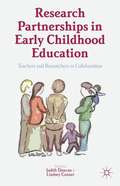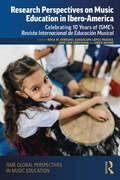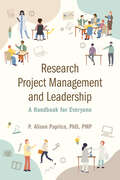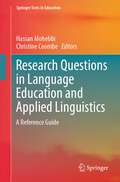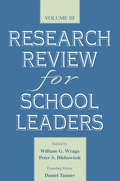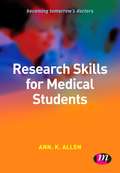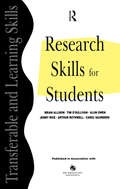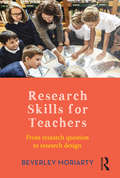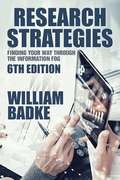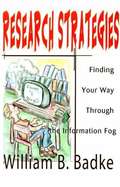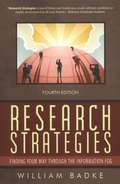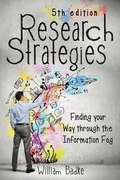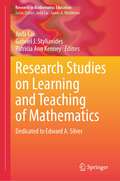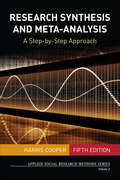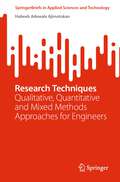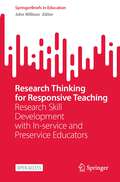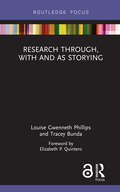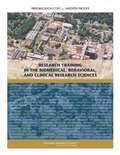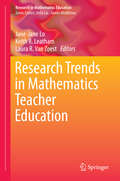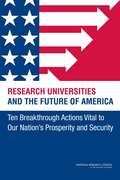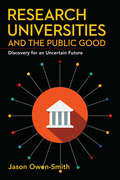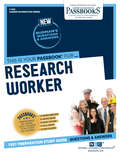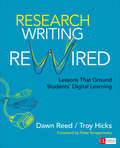- Table View
- List View
Research Partnerships in Early Childhood Education
by Judith Duncan Lindsey ConnerDuncan and Conner demonstrate how collaborative research on early childhood education results in gains for educators, researchers, and children alike. Drawing on examples of successful partnerships from Canada, Australia, and New Zealand, they set out the successes, struggles, insights, and opportunities that come from such partnerships.
Research Perspectives on Music Education in Ibero-America: Celebrating 10 Years of ISME’s Revista Internacional de Educación Musical (ISME Series in Music Education)
by Gwen Moore Guadalupe López-Íñiguez José Luis Aróstegui Rosa M. SerranoThis volume brings together a selection of essential articles from the journal Revista Internacional de Educación Musical (RIEM), a Spanish-language journal published by the International Society for Music Education, making this work available to an English-speaking audience for the first time. With chapters representing a wide range of countries in the Ibero-American world, including Argentina, Brazil, Chile, Colombia, Mexico, Portugal, and Spain, the book aims to develop international exchange in the music education community. The book is structured around key themes, including music teacher training, youth music education, higher music education, and sociomusical programs, with a focus on opportunities for improvement across music education contexts inside and outside schools. Making vibrant research and practice from across the region available to a wider international audience, this book facilitates exchanges between researchers and educators and enhances global music education studies by highlighting groundbreaking work from Spanish- and Portuguese-speaking countries.
Research Project Management and Leadership: A Handbook for Everyone
by P. Alison PapricaThe project management approaches, which are used by millions of people internationally, are often too detailed or constraining to be applied to research. In this handbook, project management expert P. Alison Paprica presents guidance specifically developed to help with the planning, management, and leadership of research. Research Project Management and Leadership provides simplified versions of globally utilized project management tools, such as the work breakdown structure to visualize scope, and offers guidance on processes, including a five-step process to identify and respond to risks. The complementary leadership guidance in the handbook is presented in the form of interview write-ups with 19 Canadian and international research leaders, each of whom describes a situation where leadership skills were important, how they responded, and what they learned. The accessible language and practical guidance in the handbook make it a valuable resource for everyone from principal investigators leading multimillion-dollar projects to graduate students planning their thesis research. The book aims to help readers understand which management and leadership tools, processes, and practices are helpful in different circumstances, and how to implement them in research settings.
Research Questions in Language Education and Applied Linguistics: A Reference Guide (Springer Texts in Education)
by Christine Coombe Hassan MohebbiThis volume encompasses the range of research questions on language-related problems that arise in language teaching, learning and assessment. The [150] chapters are written by experts in the field who each offer their insights into current and future directions of research, and who suggest several highly relevant research questions. Topics include, but are not limited to: language skills teaching, language skills assessment and testing, measurement, feedback, discourse analysis, pragmatics, semantics, language learning through technology, CALL, MALL, ESP, EAP, ERPP, TBLT, materials development, genre analysis, needs analysis, corpus, content-based language teaching, language teaching and learning strategies, individual differences, research methods, classroom research, form-focused instruction, age effects, literacy, proficiency, and teacher education and teacher development. The book serves as a reference and offers inspiration to researchers and students in language education. An important skill in reviewing the research literature is following a study’s “plan of attack.” Broadly, this means that before accepting and acting upon the findings, one considers a) the research question (Is it clear and focused? Measurable?), b) the subjects examined, the methods deployed, and the measures chosen (Do they fit the study’s goal and have the potential to yield useful results?), and c) the analysis of the data (Do the data lead to the discussion presented? Has the author reasonably interpreted results to reach the conclusion?). Mohebbi and Coombe’s book, Research Questions in Language Education and Applied Linguistics: A Reference Guide, helps budding researchers take the first step and develop a solid research question. As the field of language education evolves, we need continual research to improve our instructional and assessment practices and our understanding of the learners’ language learning processes. This book with its remarkable 150 topics and 10 times the number of potential research questions provides a wealth of ideas that will help early career researchers conduct studies that move our field forward and grow our knowledge base. Deborah J. Short, Ph.D., Director, Academic Language Research & Training, Past President, TESOL International Association (2021-22)As a teacher in graduate programs in TESOL I frequently come across the frustration of students at centering their research interests on a particular topic and developing research questions which are worth pursuing so as to make a contribution to the field. This frustration stems from the fact that our field is so vast and interrelated, that it is often impossible to properly address all that interests them. Hence, I wholeheartedly welcome this most relevant and innovative addition to the research literature in the field of TESOL and Applied Linguistics. Coombe and Mohebbi have created a real tour de force that stands to inform budding researchers in the field for many years to come. Additionally, the cutting-edge depiction of the field and all it has to offer will no doubt update the research agendas of many seasoned researchers around the world. The 150 chapters are organized in a most powerful, yet, deceptively simple way offering a positioning within the topic, suggesting questions that might direct inquiry and offering a basic set of bibliographic tools to start the reader in the path towards research. What is more, the nine sections in which the chapters are organized leave no area of the field unexplored. Dr. Gabriel Díaz Maggioli, Academic Advisor, Institute of Education, Universidad ORT del Uruguay, President, IATEFL
Research Review for School Leaders: Volume Iii
by Peter S. Hlebowitsh William G. Wraga Daniel TannerThe Research Review for School Leaders, Volume III is specifically designed as a practical resource for school leaders whose schedules preclude opportunities to locate and review key research on every issue they must address. It places comprehensive, current, and accessible reviews of educational research at their fingertips, and is organized to make the research and practices it summarizes useful to them in their professional endeavors. This is the third volume of the Review. Although the title has changed, its purpose and substance is continuous with the work of the earlier volumes. The first Annual Review of Research for School Leaders (1996) summarized research on the status of public schooling, interdisciplinary curriculum, and educational applications of computers. The second volume (1998) addressed the topics of middle-level education, the extracurriculum, mathematics education reform, and drop outs. The present Volume III offers educational leaders reviews of research on five timely educational issues: * citizenship education; * multicultural education; * gifted and talented education; * classroom assessment; and * scheduling. A basic premise of this volume is that, to make sound decisions, professionals need to be up to date on current research related to the problems with which they grapple. A second premise is that research cannot simply be imposed in a formulaic way on a local setting; the nature of the particular problem to be solved will always bear upon the relevance of research to a specific context. Thus, this volume is envisioned as a helpful resource for school leaders as they engage in important discussions of the research with teachers, school board members, parents, and other interested parties as they collaboratively seek effective resolutions to local educational problems.
Research Skills for Medical Students (Becoming Tomorrow′s Doctors Series)
by Ann AllenThe revised Tomorrow′s Doctors makes it clear that doctors need to be aware of their responsibilities as scholars and scientists and it is therefore vital that students develop excellent research skills. Whilst there are many ′research skills′ books, medical students frequently struggle with understanding the difference between the practices of research, audit, service evaluation, systematic and narrative reviews and when and how to apply them. This book addresses the kinds of questions novice investigators always ask and helps students utilise study designs, data collection tools and analysis effectively.
Research Skills for Students (Transferable And Learning Skills Ser.)
by Brian Allison Tim O'Sullivan Anne Hilton Alun Owen Arthur RothwellThis fully photocopiable teaching resource provides tutors with a varied and lively range of learning activities and exercises to use with students to help equip them with the skills needed to plan for a research project in higher education.
Research Skills for Teachers: From research question to research design
by Beverley MoriartyUnderstanding research principles and developing a small-scale research project is increasingly required of both pre-service and in-service teachers at early childhood, primary and secondary levels. In Research Skills for Teachers Beverley Moriarty provides an accessible guide to every aspect of education research appropriate to the needs of the beginner. The book helps readers identify their area of research interest and then focus their topic into something manageable yet original and sustainable. There are comprehensive, readable explanations of key concepts and technical terms, and realistic examples throughout show how ideas can be put into action. The text adopts an iterative approach, encouraging readers to revisit research questions, research design and methodology as they progress through the stages of planning and execution. The book provides clear guidance on core issues including:*Understanding and completing a literature review*Quantitative and qualitative approaches* Developing interviews and surveys* Analysing data * Ethical issues and dilemmasFeaturing an accessible, step-by-step approach and rich with case studies and exercises, this is an essential tool for anyone embarking on a career in teaching.'I found this text highly accessible, authoritative and well structured... The examples and boxes provided are effective ways to organize a complex and often opaque process for novice researchers, especially pre-service teachers... The frameworks, notebook activities and tables are intuitive and useful.' Dr Alexandra McCormick, Sydney School of Education and Social Work, University of Sydney
Research Strategies: Finding Your Way Through The Information Fog (Sixth Edition)
by William BadkeWe live in a time when there is more knowledge available to us than ever before. Yet we struggle to make sense of it. When a research deadline looms and all you see is a confusing fog of data, you know you need help. In this sixth edition of Research Strategies, author William Badke helps you make sense of it all. He will show you how to navigate the information fog intelligently, and he will detail how to use it to your advantage to become a better researcher. Badke focuses on informational research and provides a host of tips and advices not only for conducting research, but also for everything from finding a topic to writing an outline to locating high quality, relevant resources to finishing the final draft. Study guides, practice exercises, and assignments at the end of each chapter will help reinforce the lessons. As an experienced researcher who has led thousands of students to ramp up their research abilities, Badke uses humor to help you gain a better understanding of today's world of complex technological information. Research Strategies provides the skills and strategies to efficiently and effectively complete a research project from topic to final product.
Research Strategies: Finding Your Way Through the Information Fog
by William B. BadkeFilled with time-tested strategies and expert advice, Research Strategies teaches you the skills that are essential to the success of any research project.
Research Strategies: Finding Your Way Through the Information Fog 4th Edition
by William BadkeBecause of the dynamic nature of the Internet, any web addresses or links contained in this book may have changed since publication and may no longer be valid. The views expressed in this work are solely those of the author and do not necessarily reflect the views of the publisher, and the publisher hereby disclaims any responsibility for them.
Research Strategies: Finding Your Way through the Information Fog
by William BadkeOnline resources have given us access to more knowledge than ever before. We're buried in data, and defining what is and what is not genuine information becomes more of a challenge all the time. In this fifth edition of Research Strategies, author William Badke helps you make sense of all of the available information, shows you how to navigate and discern it, and details how to use it to your advantage to become a better researcher. Badke focuses on informational research and provides a host of tips and advice not only for conducting research, but also for everything from finding a topic to writing an outline to documenting resources and polishing the final draft. Study guides, practice exercises, and assignments at the end of each chapter help reinforce each lesson. An experienced research instructor who has led thousands of students to become better researchers, Badke uses humor to help you gain a better understanding of today's complex, technological world. Research Strategies provides the skills and strategies to efficiently and effectively complete a research project from topic to finished product. It shows how research can be exciting and even fun.
Research Studies on Learning and Teaching of Mathematics: Dedicated to Edward A. Silver (Research in Mathematics Education)
by Jinfa Cai Gabriel J. Stylianides Patricia Ann KenneyThis book is about promising research advancements that sparked directly or indirectly from intellectual contributions by distinguished internationally recognized mathematics educator and researcher, Edward A. Silver. The features of this book include:A focus on the research areas that have benefited from Dr. Silver’s intellectual contributions and influence, such as designing instructional tasks, problem posing, problem solving, preservice teacher learning, in service teacher professional development, and mathematics assessmentChapters written by contributors who at one time were his doctoral or post-doctoral colleagues along with any invited co-authorsA brief bio of Dr. Silver showing his intellectual journey, key milestones in his career, and scholarly accomplishments that sparked from his intellectual contributions
Research Synthesis and Meta-Analysis: A Step-by-Step Approach (Applied Social Research Methods #2)
by Harris CooperThe Fifth Edition of Harris Cooper′s bestselling text offers practical advice on how to conduct a synthesis of research in the social, behavioral, and health sciences. The book is written in plain language with four running examples drawn from psychology, education, and health science. With ample coverage of literature searching and the technical aspects of meta-analysis, this one-of-a-kind book applies the basic principles of sound data gathering to the task of producing a comprehensive assessment of existing research.
Research Synthesis and Meta-Analysis: A Step-by-Step Approach (Applied Social Research Methods #2)
by Harris CooperThe Fifth Edition of Harris Cooper′s bestselling text offers practical advice on how to conduct a synthesis of research in the social, behavioral, and health sciences. The book is written in plain language with four running examples drawn from psychology, education, and health science. With ample coverage of literature searching and the technical aspects of meta-analysis, this one-of-a-kind book applies the basic principles of sound data gathering to the task of producing a comprehensive assessment of existing research.
Research Techniques: Qualitative, Quantitative and Mixed Methods Approaches for Engineers (SpringerBriefs in Applied Sciences and Technology)
by Habeeb Adewale AjimotokanThis book provides a hands-on guide towards conducting state-of-the-art engineering research and gaining a patent. It lists pragmatic, step-by-step instructions that cover every stage in engineering research and patent gaining, from choosing a topic to the presentation of research outcomes or patent application. The topics include the introduction and basic concepts of engineering research; research problem and questions; use of libraries, literature search and review; developing a research plan; research data collection methods, analysis and interpretation; project report writing and presentations; and inventions and patents. This book is ideal for engineering undergraduate and postgraduate students and/or first-time or novice researchers and academics intending to launch their research studies and careers.
Research Thinking for Responsive Teaching: Research Skill Development with In-service and Preservice Educators (SpringerBriefs in Education)
by John WillisonThis open access book examines the facilitation of pre-service and in-service educators’ research thinking that equips them to be responsive to the unfolding uncertainties of the 21st century, and to likewise prepare their own students. It addresses several key areas, including: articulating the contemporary need for research thinking across teacher education; showcasing diverse yet conceptually connected strategies that all use the Research Skill Development (RSD) framework; providing an explicit scaffolded approach; and extending knowledge of the 'Models of Engaged Learning and Teaching' (MELT) conceptual framework. This book also addresses the contemporary topics of social media for learning, digital literacy, education research as cultural work and formations of communities of practice, with cross-cutting themes of scaffolded development and formative assessment of research skills. It highlights how research thinking is not only vital for PST (Preservice Teachers), I-ST (In-Serivce Teachers) and university educators, but also models for them how to scaffold the research thinking of their own students. This book's use of the RSD, as a shared conceptual framework across the chapters, emphasises the overlaps between ways of thinking in the different learning areas in which education occurs, without masking the differences. Likewise, the interdisciplinary work that comprises Education is informed by the RSD conceptual framework as used in a variety of disciplines. Together, this use of RSD brings a strong sense of connectedness between PST, I-ST and university educators.This is an open access book.
Research Through, With and As Storying
by Louise Gwenneth Phillips Tracey BundaResearch Through, With and As Storying explores how Indigenous and non-Indigenous scholars can engage with storying as a tool that disassembles conventions of research. The authors explore the concept of storying across different cultures, times and places, and discuss principles of storying and storying research, considering Indigenous, feminist and critical theory standpoints. Through the book, Phillips and Bunda provide an invitation to locate storying as a valuable ontological, epistemological and methodological contribution to the academy across disciplines, arguing that storying research gives voice to the marginalised in the academy. Providing rich and interesting coverage of the approaches to the field of storying research from Aboriginal and white Australian perspectives, this text seeks to enable a profound understanding of the significance of stories and storying. This book will prove valuable for scholars, students and practitioners who seek to develop alternate and creative contributions to the production of knowledge.
Research Training in the Biomedical, Behavioral, and Clinical Research Sciences
by National Research Council of the National AcademiesComprehensive research and a highly trained workforce are essential for the improvement of health and health care both nationally and internationally. Over the past 40 years the National Research Services Award (NRSA) Program has played a large role in training the workforce responsible for dramatic advances in the understanding of various diseases and new insights that have led to more effective and targeted therapies. In spite of this program, the difficulty obtaining jobs after the postdoc period has discouraged many domestic students from pursuing graduate postdoc training. In the United States, more than 50 percent of the postdoc workforce is made up of individuals who obtained their Ph.D.s from other countries. Indeed, one can make a strong argument that the influx of highly trained and creative foreigners has contributed greatly to U.S. science over the past 70 years. Research Training in the Biomedical, Behavioral, and Clinical Research Sciences discusses a number of important issues, including: the job prospects for postdocs completing their training; questions about the continued supply of international postdocs in an increasingly competitive world; the need for equal, excellent training for all graduate students who receive NIH funding; and the need to increase the diversity of trainees. The book recommends improvements in minority recruiting, more rigorous and extensive training in the responsible conduct of research and ethics, increased emphasis on career development, more attention to outcomes, and the requirement for incorporating more quantitative thinking in the biomedical curriculum.
Research Trends in Mathematics Teacher Education
by Jane-Jane Lo Keith R. Leatham Laura R. Van ZoestResearch on the preparation and continued development of mathematics teachers is becoming an increasingly important subset of mathematics education research. Such research explores the attributes, knowledge, skills and beliefs of mathematics teachers as well as methods for assessing and developing these critical aspects of teachers and influences on teaching. Research Trends in Mathematics Teacher Education focuses on three major themes in current mathematics teacher education research: mathematical knowledge for teaching, teacher beliefs and identities, and tools and techniques to support teacher learning. Through careful reports of individual research studies and cross-study syntheses of the state of research in these areas, the book provides insights into teachers' learning processes and how these processes can be harnessed to develop effective teachers. Chapters investigate bedrock skills needed for working with primary and secondary learners (writing relevant problems, planning lessons, being attentive to student learning) and illustrate how knowledge can be accessed, assessed, and nurtured over the course of a teaching career. Commentaries provide context for current research while identifying areas deserving future study. Included among the topics: Teachers' curricular knowledge Teachers' personal and classroom mathematics Teachers' learning journeys toward reasoning and sense-making Teachers' transitions in noticing Teachers' uses of a learning trajectory as a tool for mathematics lesson planning A unique and timely set of perspectives on the professional development of mathematics teachers at all stages of their careers, Research Trends in Mathematics Teacher Education brings clarity and practical advice to researchers as well as practitioners in this increasingly critical arena
Research Universities and the Future of America
by National Research Council Policy and Global Affairs Board on Higher Education and Workforce Committee on Research UniversitiesResearch Universities and the Future of America presents critically important strategies for ensuring that our nation's research universities contribute strongly to America's prosperity, security, and national goals. Widely considered the best in the world, our nation's research universities today confront significant financial pressures, important advances in technology, a changing demographic landscape, and increased international competition. This report provides a course of action for ensuring our universities continue to produce the knowledge, ideas, and talent the United States needs to be a global leader in the 21st century. Research Universities and the Future of America focuses on strengthening and expanding the partnership among universities and government, business, and philanthropy that has been central to American prosperity and security. The report focuses on the top 10 actions that Congress, the federal government, state governments, research universities, and others could take to strengthen the research and education missions of our research universities, their relationships with other parts of the national research enterprise, and their ability to transfer new knowledge and ideas to those who productively use them in our society and economy. This report examines trends in university finance, prospects for improving university operations, opportunities for deploying technology, and improvement in the regulation of higher education institutions. It also explores ways to improve pathways to graduate education, take advantage of opportunities to increase student diversity, and realign doctoral education for the careers new doctorates will follow. Research Universities and the Future of America is an important resource for policy makers on the federal and state levels, university administrators, philanthropic organizations, faculty, technology transfer specialists, libraries, and researchers.
Research Universities and the Public Good: Discovery for an Uncertain Future (Innovation and Technology in the World Economy)
by Jason Owen-SmithIn a political climate that is skeptical of hard-to-measure outcomes, public funding for research universities is under threat. But if we scale back support for these institutions, we also cut off a key source of value creation in our economy and society. Research Universities and the Public Good offers a unique view of how universities work, what their purpose is, and why they are important. Countering recent arguments that we should "unbundle" or "disrupt" higher education, Jason Owen-Smith argues that research universities are valuable gems that deserve support. While they are complex and costly, their enduring value is threefold: they simultaneously act as sources of new knowledge, anchors for regional and national communities, and hubs that connect disparate parts of society. These distinctive features allow them, more than any other institution, to innovate in response to new problems and opportunities. Presenting numerous case studies that show how research universities play these three roles and why they matter, this book offers a fresh and stirring defense of the research university.
Research Worker: Passbooks Study Guide (Career Examination Series)
by National Learning CorporationThe Research Worker Passbook® prepares you for your test by allowing you to take practice exams in the subjects you need to study. It provides hundreds of questions and answers in the areas that will likely be covered on your upcoming exam, including but not limited to: Understanding and interpreting written material; Record keeping; and more.
Research Writing Rewired: Lessons That Ground Students’ Digital Learning (Corwin Literacy)
by Dawn M. Reed Troy W. HicksOur students are online constantly, and yet research shows that only half of teachers say digital tools make writing instruction easier. Research Writing Rewired seeks to turn that statistic upside down. Or, rather, upside right: If we want to ready students for a globalized world, 100% of teachers ought to consider technology an asset to any kind of writing, assert authors Dawn Reed and Troy Hicks. But the "main wiring" still has to be the ELA standards and the essential questions at the heart of each content area. To that end, the authors show you how to use digital tools within a multi-week inquiry unit to increase students’ engagement as they write-to-learn and share knowledge. Their book a clear model for tech-rich research writing that will inform your own inquiry-driven units. Guiding components include: An inquiry-based, technology-rich unit on identity and culture that provides learners with opportunities to engage with the very same issues that are written about and discussed by citizens of a global society 28 model lessons and a framework including extensions, tech tips, and activities that blend print, image, apps, and video so students build multi-literacy skills day by day Recurring use of best practices like formative assessment, close reading, think alouds and teaching key skills, including analyzing and synthesizing, annotating, checking credibility of sources, discussion, and writing about reading Dozens of lessons and activities built around students’ favorite technology tools and online destinations, including: Citelighter, Smore, ThingLink, Padlet, and Cazles, Animoto, Mural.ly, and getLoupe, Genius and Lit Genius, Now Comment, You Voices QR codes that take you to video clips on a companion website, so you can see the teaching techniques and digital tools in action It’s up to us to make the digital learning in school a lot more like the digital learning we all do in life. Research Writing Rewired shows us how to channel students’ passion for digital communication into meeting ELA goals.
Research Writing Rewired: Lessons That Ground Students’ Digital Learning (Corwin Literacy)
by Dawn M. Reed Troy W. HicksOur students are online constantly, and yet research shows that only half of teachers say digital tools make writing instruction easier. Research Writing Rewired seeks to turn that statistic upside down. Or, rather, upside right: If we want to ready students for a globalized world, 100% of teachers ought to consider technology an asset to any kind of writing, assert authors Dawn Reed and Troy Hicks. But the "main wiring" still has to be the ELA standards and the essential questions at the heart of each content area. To that end, the authors show you how to use digital tools within a multi-week inquiry unit to increase students’ engagement as they write-to-learn and share knowledge. Their book a clear model for tech-rich research writing that will inform your own inquiry-driven units. Guiding components include: An inquiry-based, technology-rich unit on identity and culture that provides learners with opportunities to engage with the very same issues that are written about and discussed by citizens of a global society 28 model lessons and a framework including extensions, tech tips, and activities that blend print, image, apps, and video so students build multi-literacy skills day by day Recurring use of best practices like formative assessment, close reading, think alouds and teaching key skills, including analyzing and synthesizing, annotating, checking credibility of sources, discussion, and writing about reading Dozens of lessons and activities built around students’ favorite technology tools and online destinations, including: Citelighter, Smore, ThingLink, Padlet, and Cazles, Animoto, Mural.ly, and getLoupe, Genius and Lit Genius, Now Comment, You Voices QR codes that take you to video clips on a companion website, so you can see the teaching techniques and digital tools in action It’s up to us to make the digital learning in school a lot more like the digital learning we all do in life. Research Writing Rewired shows us how to channel students’ passion for digital communication into meeting ELA goals.
